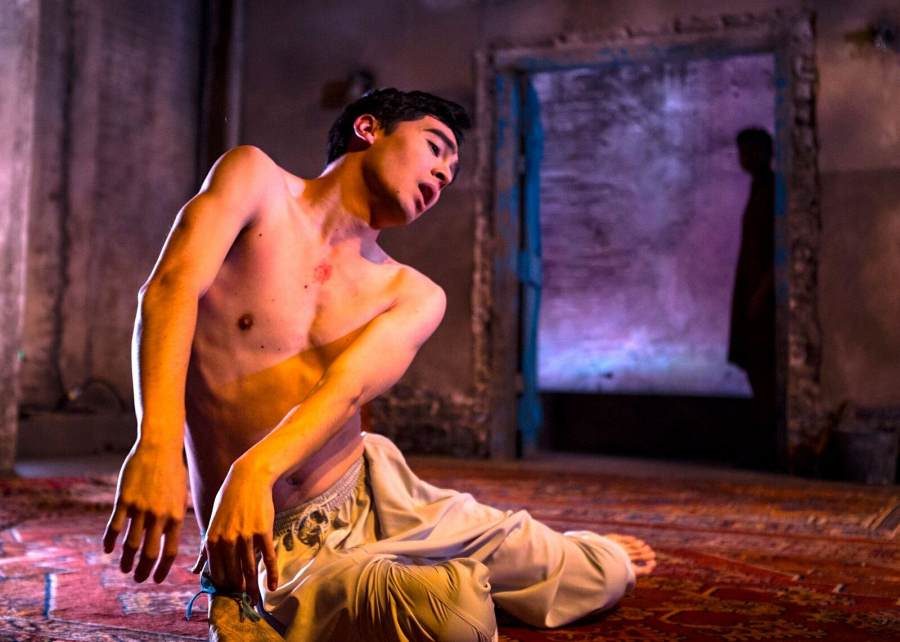

“Dancing boys are meant to be obedient to the men they serve. When one of those boys becomes a man, capable of making decisions for himself, the balance in his relationship is thrown off.”
Such is the idea explored front and center in Abingdon Theatre Company’s new musical work The Boy Who Danced on Air, now playing at the June Havoc Theatre. The result, expertly brought to life by director Tony Speciale, is interesting to put it lightly. After all, with a company that specializes in producing “brave new work” (and this one definitely fits the bill), what else would you expect?
The story, set in Afghanistan, is based on bacha bazi — the illegal practice of wealthy men buying young boys from poor parents, and teaching them to dance in traditionally female garb, before sexually abusing them in the home. But a word to the uneasy: it’s not all this piece is about. This vibrant, “brave” work will surprise you in a way you won’t see coming, and you’ll leave feeling fulfilled as ever, with a fresh look on life and a reinvigorated passion for doing all that you can.
The plot follows dancer Paiman (the golden-voiced Troy Iwata), who struggles to stay loyal to his master when he meets Feda (Nikhil Saboo), who lures him away from his master’s tight grasp with his dreams of escaping to the big city, forcing Paiman to test his limits and break free from all he’s ever known. A politically-driven subplot involving the master, Jahandar (Jonathan Raviv), who plots to expose the American power plant at which he works for taking advantage of their Afghan employees, seems tangential until the show’s last moments, when the two throughlines intertwine in a grippingly explosive finale. And it’s all presented amidst this excruciatingly horrific practice, and the physical and mental torture these boys face in their daily lives.
No doubt a lot to handle, for audiences and performers alike, and definitely one you’d be hesitant to musicalize, but the numbers are a welcome levity to the subject at hand. Not to mention, they’re beautiful works of art in themselves; the haunting melodies (Tim Rosser) have a Middle Eastern feel, and the complexity of the carefully-worded lyrics, rich with symbolism (the masterful work of Charlie Sohne) resonate on multiple levels (see songs such as “With Him Around Me,” and “When I Have a Boy of My Own,” the former of which repeats throughout the show, which at first seem to be about Paiman and Feda’s tight-knight relationship with their masters, but as the piece progresses and their relationship intensifies, Paiman moving further and further out of Jahandar’s grasp, the ‘Him’ and ‘Boy’ of each take on a different meaning entirely). A particular favorite of this writer was “Little Dance,” which articulated Paiman’s undying passion for dance, while showcasing Iwata’s unparalleled agility on the dance floor.
If you’re not already captivated watching Iwata's nimble body float across the stage, his impeccable golden voice, which soars higher with each note he sings, will surely pull you in further. The same goes for Saboo, equally entrancing with his vocal contributions, and a characterization that epitomizes Feda’s fervent desire to break free from this demoralizing lifestyle and follow his dream. Raviv, too, is alive in his character, and you can see his internal struggle of wanting to protect Paiman and keep him, as he gradually comes to realize he’s losing his boy to the perilous “real world.” Despite the horrible way he treats Paiman, the love is still there — and that’s wholeheartedly on display thanks to Raviv’s powerful performance. Meanwhile, Osh Ghanimah, in a supporting role, expertly maneuvers through the more comic portions of the play, and still manages to make you laugh amid the horror that’s unfolding while he’s doing so. And Deven Nolluri induces goosebumps as the mysterious narrator lingering in the background, with a surprising connection to the characters involved in the action.
But with a play filled with so many different factors, and a host of dazzling visual and musical elements that toy with your emotions on every level, it’s this story of hope, determination and self-belief that really keeps you centered, focused, and enthralled. You’re continually enlivened by Paiman and his passion for dance, his “can-do” attitude and his inspiring determination to keep moving forward. He’s beaten and worn-down, but still, nothing can stop him. When disaster strikes and he finds himself unable to dance at one point in the action, it doesn’t faze him — he simply creates a dance to fit his new circumstances. His passion and desire for are greater than his setbacks.
And that’s the big takeaway for the audience. Find that strength to push beyond your boundaries. Break free and be unlimited. Because, yes, though you indeed, at times, may be trapped, forced to dance perpetually to “a song you never chose,” you still, if you allow yourself, have control over how you dance through it. And in embracing that ability, you, too, can escape. You, too, can be a risk-taker. And you, too, can dance on air.